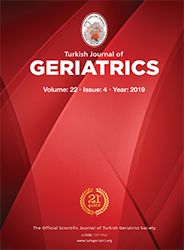2University of Health Sciences, Fatih Sultan Mehmet Health Application and Research Center, General Surgery, Ä°stanbul, Turkey
3University of Health Sciences, Fatih Sultan Mehmet Health Application and Research Center, Intensive Care, Ä°stanbul, Turkey DOI : 10.31086/tjgeri.2020.117 Introduction: The number of geriatric patients undergoing emergency surgery is increasing worldwide. The objective of our study was to retrospectively review the intensive care unit (ICU) admission rates, mortality rates and the mortality risk factors in geriatric patients undergoing emergency abdominal surgery.
Materials and Method: The data of patients who underwent emergency abdominal surgery between January 2014 and August 2018 were retrospectively reviewed. Patients were classified into Group-I (?75 years) and Group-II (65?74 years). American Society of Anesthesiologists (ASA) physical status, haemoglobin values, whether preoperative cardiac examinations were conducted, ICU admission and mortality rates were recorded. The two groups were compared in terms of ICU admission rates, ICU and in-hospital mortality rates and the factors affecting these parameters.
Results: A total of 109 patients were included in the study with 71 (65.1%) being in Group-I and 38 (34.9%) in Group-II. ICU admission rate and in-hospital mortality rates were higher in Group-I than those in Group-II. High ASA score in Group I and high ASA score and low haemoglobin value in Group-II affected ICU admission rate. It was observed that the absence of preoperative cardiac examination increased ICU mortality in Group-I. High ASA scores in both the groups increased in-hospital mortality. In addition, postoperative ICU admission rate increased in-hospital mortality in Group-II.
Conclusion: ASA score was found to be the most important factor affecting mortality rates in geriatric patients after emergency surgery. It was concluded that ICU mortality rates can be decreased by utilising necessary treatment protocols by performing preoperative cardiologic examinations geriatric patients aged >75 years.
Keywords : Geriatrics; Morbidity; Mortality; General Surgery
